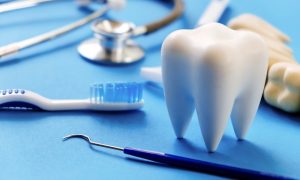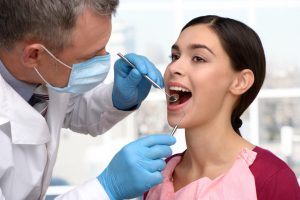Indeed, dental care often comes last on the priority list when it comes to maintaining one’s health. However, it is also important to note that this is an integral part of the system. It reduces dependence on costs involved in dental treatments and at the same time equips one with adequate measures to preventively address any such problems in the future.
The Interdependence of Oral Health Practices and Overall Health Benefits:
For a lot of people, the perception of oral health is restricted to the use of mouthwash, teeth whitening, or gum brushing and flossing. The persistence of poor oral hygiene can give rise to respiratory illnesses, diabetes, and even heart problems. Along these lines, gum diseases have been found to often precede major cardiovascular risks, as bacteria from the inflamed area migrate towards arterial walls and result in arterial plaque. And lastly, if one suffers from diabetes and does not maintain their oral hygiene, throughout the course, their risk for diabetes-related infections only increases. This indicates how crucial good dental health is to minimizing the impacts of diabetes.
Not only this, ignoring oral hygiene further deteriorates one’s underlying health, including the risk of low birth weight and premature births. Together, these points indicate the need for undertaking regular visits to the dentist, and what would encourage this is having access to dental insurance.
The High Cost of Dental Care:
The average price for dental work can be quite exorbitant, especially if one doesn’t have insurance. A basic dental procedure like cleaning can cost anywhere between 50 and 200 dollars, while more advanced procedures such as root canals or crowns can cost thousands of dollars, ranging from 1 to 3 thousand dollars. Other unexpected costs may come up during dental emergencies, like a sudden toothache or a broken tooth, which may create a dent in finances.
These costs usually discourage people from traveling abroad for dental treatment, which essentially in turn hurts more in the places over the course of increased costs, especially the most vulnerable places without insurance. This is why dental insurance is important to cost cover more, which in turn helps steer people in taking care of their oral health.
Benefits of Having Dental Insurance:
Thanks to insurance, oral prophylaxis is more cost-effective and simpler, such as cleaning or seeing the doctor, which helps to prevent the risk of having a serious problem with the teeth appearing. Almost all plans offer the option of cleanings and other examinations a couple of times within a year, with a degree of the price of larger procedures paid.
Benefits may differ depending on the plan, but it is generally offered that their benefits include:
- Performing regular checkups and cleaning on a regular basis
- Performing fillings and extractions
- Taking X-rays
- Providing orthodontics and other denture care under particular plans
Insurance companies promote active observation of your oral hygiene and the structural integrity of your mouth, preventing any explicit issues from developing. Thus, it ultimately saves you money and allows you to stay healthy from future chronic diseases.
Evolution of Dental Insurance:
The past two decades have witnessed a sharp increase in the rate of acquiring dental insurance coverage. Even though they are not usually integrated into most health insurance programs, they are easily accessible as bolt-on policies. The trend is particularly geared toward developing more kulak packages that cover the needs of the target clients, including cosmetic and orthodontic procedures.
Insurance service providers are changing gradually towards a back-end model of business where the focus is on preventive care rather than restorative care. Care is also based on practice management, which is cost-effective in the long run. The strategy aims at developing customer orientation and providing more options that are easier to use.
Who Stands to Gain From It:
The set of people who do gain superior benefits includes, but is not limited to, everybody. However, it would be said that some classes are most likely to benefit the most. Aspartame products tend to be available for both individuals and families through group and individual plans. Employer-sponsored plans tend to be a lot cheaper, while individual plans are more expensive but more flexible and cater to the specific needs of people.
How to Choose a Plan?
Choosing a good insurance policy that covers all the bases can be a tad difficult as there are numerous things to bear in mind: First, what are your coverage needs? Understand how often a specific work needs to be done or can be predicted. Then choose the plan that covers those works.
- Network: To get the most benefits, make sure your favorite dentist is a part of the insurance network.
- Cost: Scrutinize premiums, deductibles, and out-of-pocket expenses to settle for an affordable option.
- Waiting Periods: inquire about whether there are any waiting periods before coverage starts for major procedures.
Taking these aspects into consideration will help you get a plan that fits your needs and budget perfectly.
The Role of Technology in Making Dental Care More Accessible:
Technology is changing the landscape of dental care for the better, making dental procedures more reachable and cheaper. Patients seek consultations from their dentists through teledentistry and do not have to go to clinics rather than making it close to somewhat impossible to have fewer in-person visits. The use of artificial intelligence in diagnostics also helps increase the accuracy of assessments; as a result, treatment gets considerably improved.
The same applies when searching for particular types of insurance, which through different websites has now become much easier and less time-consuming. These changes are helping patients have better experiences and increasing their active participation in managing oral health.
Conclusion:
For the welfare of oral and general health, dental insurance becomes especially important. It facilitates access to preventative care, lessens the financial burden of dental treatments, and allows oral problems to be diagnosed and treated early. By opting for dental insurance, a person is taking steps to ensure their health and well-being from a proactive standpoint.
Don’t delay until you have a dental emergency; feel free to check out what options your dental insurance has for you and get the coverage you deserve for a better tomorrow.
FAQs:
1. Are there any coverage restrictions for cosmetic procedures under dental insurance?
Most of the time, dental insurance does not pay out for cosmetic procedures or dental services such as plastic surgery procedures, teeth whitening, or veneers. However, under certain plans, certain partial coverage can be provided.
2. When is the most ideal period for one to visit or schedule an appointment with a dentist?
It is advised to make a visit to your dentist every six months; the appointment is usually for a routine checkup and cleaning. However, your dentist may decide on a different schedule based on your dental health needs.
3. If I have pre-existing conditions, does that mean that I cannot get coverage under dental insurance?
A simple yes will answer this. You can still get coverage under dental insurance with preexisting conditions; however, some may have waiting periods or limit certain treatments for those conditions.
4. What can I do in case my chosen dentist does not participate in my insurance plan’s network?
You can go to an out-of-network dentist; however, be prepared to spend more than you expect, on the other hand, if you want to avoid the extra costs. Then go to a dentist that falls under your insurance networks.
5. Do people who have dental insurance also have orthodontics as a benefit in their policies?
Typically, children’s dental insurance policies include some form of orthodontic coverage, although less frequently, policies for adults include such coverage or the coverage is mandatory. And again, please read your policy in full detail.




